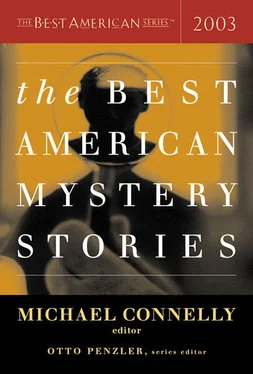Miguel picked up the doormat and shook it to get the dust off. It seemed like something Mrs. Mitchell might be fond of. That morning he had kept watch through the bathroom keyhole. She was out of sight, but he caught the scent of her worry. He knew she needed something.
In Caracas he had gone through the trash regularly, looking for things to play with and at times for something to eat. Ever since he heard about his father being naked on the highway, he had been remembering more about his life there, and even reverting to some of his old habits; as if the non sequitur of his father’s nudity had tenderly shaken him awake. He lay in bed at night and looked into the eyes of the papier-mâché head for guidance. He had two lives now, two countries, and two mothers. Soon he would find another life without his father, and another, when he went away to college, and another life, and another, and another, and another; each of them thin, fragile casings echoing the hum of what had gone before.
The boy walked into the kitchen and found his American mother sitting with a strange man. They both held steaming mugs of coffee. Buster was under the table, waking from his afternoon nap. He saw Miguel and thumped his tail halfheartedly against the floor. The adults turned. Now what have you got there?
Lieutenant Sales took Home Sweet Home in his hands. He felt it was what he had been looking for. The twisted pink skin where the shark had bitten him began to itch. It had been tingling all afternoon. He hadn’t had sensation there for years — the buildup of scar tissue had left him numb — but there was something in the look of the boy and the feel of the rope that held possibility, and excitement rose like fear within him, alongside the memory of closing teeth. Later, in the lab, the welcome mat would reveal tiny spots of Pat’s blood, dog saliva, gunpowder, dead ants, mud, fertilizer, and footprints — but not the impression of Mr. Mitchell’s knees, or the hesitation of his lonely wife on the doorstep, or the hunger of his son in the garbage. All of this had been shaken off.
Lieutenant Sales would leave the Mitchells’ house that afternoon with the same thrill he’d had when the shark passed and he realized his leg was still there. He was exhilarated and then exhausted, as though his life had been drained, and he knew then that he had gone as far as he could go. Home Sweet Home would lead him back to the beginning of a murder he could not solve. There would be no scar, just the sense that he missed something, and the familiar taste of things not done. For now, he reached out with a kind of hope and accepted the welcome mat as a gift.
Mrs. Mitchell put her arm around Miguel’s shoulders and waited for Lieutenant Sales to arrest her. She would continue to wait in the weeks ahead, as suspects were raised and then dismissed and headlines changed and funerals were planned. The possibilities of these moments passed over her like shadows. When they were gone she was left standing chilled.
Clyde’s mother arranged for closed caskets. In the pew Mrs. Mitchell sat quietly. Her husband cracked knuckles beside her. He was thinking about the way Clyde’s father died — his chest pressed hard into the nothing of concrete. Mr. Mitchell was sure whoever rigged the lift had killed Pat and her husband. He worried that he could be next. He thought, Who would hold my hand? He reached for his wife and her fingers were cold.
When Mr. Mitchell first learned what had happened to his lover he had opened his closet and started to pack. His family listened to suitcases being dragged down from the attic, the swing of hangers, zipper teeth, the straps of leather buckles. Things from their home began to go missing. They reappeared when Lieutenant Sales came by. They disappeared again after the funerals. Then Mr. Mitchell said he was leaving, and his wife felt her throat clutch. She wanted to ask him where he would go; she wanted to ask him what she had done this for; she wanted to ask him why he no longer loved her but instead she asked for his son.
She had watched Miguel hand the welcome mat to the detective, and as it passed by her she felt an ache in the back of her mouth, as though she hadn’t eaten for days. Lieutenant Sales turned Home Sweet Home over in his hands. He placed it carefully on the kitchen table and Mrs. Mitchell saw the word Sweet. She remembered the milk she had made for the boy when he arrived, and sensed that this would not be the end of her. She could hear the steady breathing of her sleeping dog. She could smell the coffee. She felt the small frame of Miguel steady beneath her hand. These bones, she thought, were everything. Hey sport, Mrs. Mitchell asked. Is that for me? The boy nodded, and she held him close.
Scott Wolven
Controlled Burn
From Harpur Palate
It was a bad winter and a worse spring. It was the summer Bill Allen lived and died, the sweltering summer I landed a job cutting trees for Robert Wilson’s scab-logging outfit near Orford, New Hampshire. June boiled itself away into the heavy steam of July. Heat devils rose in waves off the blacktop as timber trucks rolled in. By the end of July, we switched gears and started cutting stove wood. I was cutting eight cords a day while Robert worked the hydraulic splitter. Then we’d deliver it in one of our dump trucks. Some men drove to the woodlot to pick up their own. Some of them had white salt marks on their boots and jackets from sweat — some of them smelled like beer. Most of them smelled like gasoline. They didn’t say much, just paid for their wood and left with it in their pickup trucks. They were either busy working or busy living their lies, which is work in itself. I knew about that. The hard work crushed one empty beer can day after another, adding to my lifetime pile of empties. Summer moved on, gray in spite of the bright sun.
That Friday, I was Bill Allen. I was Bill Allen all that summer. Bill Allen was what caused me to jump every time the phone rang. I was Bill Allen from Glens Falls, New York, and I was taking a summer off from college. I repeated that story as often and as loudly as possible. And each ring of the phone might be someone asking me to prove I was Bill Allen, which was out of the question. Back in December, in the middle of another, different lie, I tried to rob a gas station near Cape May, New Jersey. It was off-season then, nobody around, and I thought it would be easy. It fit the person I’d lied about being. A high school girl was behind the counter. I wore a ski mask and carried a cheap, semiautomatic pistol. I must have touched the trigger, because the gun went off. Maybe she lived. I really couldn’t say. I left fast. My brain was on fire, I hadn’t meant to shoot her. But it was too late for that. I took a roll of bills and ended up at Robert’s. Robert paid cash at the end of the week, didn’t bother with Uncle Sam, didn’t ask for references, and had plenty of backbreaking work that needed doing, without his son around to help him. Bill Allen was just the man for the job, and every day I was Bill Allen to the best of my ability. It didn’t help — my grim yesterdays cast the longest shadows in the Connecticut River Valley. I watched every car, studied every face. Bill Allen never knew a peaceful day. If it hadn’t been for the marathon workload Robert demanded, Bill Allen never would have slept. I’d have probably shot Bill Allen myself if I hadn’t been working so hard to keep him going. Some days, he lives on with different names. Allen Williams, Al Wilson, Bill Roberts. Bill Allen probably died in a fire that summer. Leave it at that, with questions about Bill Allen.
The phone at the woodlot rang around noon that Friday. I heard it, had been hearing it most of August. Roberts son John was in jail in Concord, awaiting trial for murderous assault, so there were a lot of phone calls. Robert had rigged the phone with two speakers — one bolted to the stovepipe that stuck out of the roof of our headquarters shack and the other attached by some baling wire to the sick elm on the end of the lot. The sudden scream of the phone spiked my heart rate at least twice a day. Echoing in the alleys between the giant piles of long logs. The woodlot sat surrounded by low, field-grass hills and trees in a natural bowl, just off the highway north of Hanover. Robert’s house was on the top of the hill, built with its back to the woodlot, facing a farm field. On a still day, the beauty of the Connecticut River drifted the quarter mile over the farm field and quietly framed all the other sounds, the birds, the trees in the breeze. I was never a part of those days.
Читать дальше












